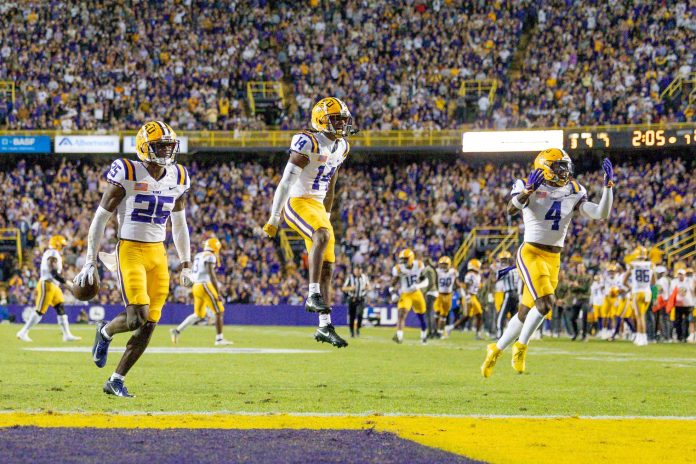Tailgates. Pageantry. Marching Bands. So many aspects make college football beyond the field of play, and a rabid fan base ready to erupt over a potential big play is a huge part, maybe even the biggest potential advantage of a home-field matchup in the fall.
While college football is performed in cathedrals we call “stadiums,” the uniqueness and diversity of each home field in design and volume on game day is why we love our teams and why we cheer them on. To be able to add “loudest stadium in college football” to your team’s resume is something every fan base should all aspire to accomplish.
For the upcoming season, let’s take a look at who can wear the title of loudest college football stadium.
Who Plays in the Loudest College Football Stadiums?
While most articles will rank teams based on size, we’re here strictly to recognize the sport’s loudest and most intense environments, regardless of size. While some may be on the larger side, there are plenty of smaller stadiums in college football that compensate accordingly. Here are our picks for the loudest stadiums based on independent criteria.
Neyland Stadium (Tennessee)
Yes, Neyland is the fifth-largest stadium in the country at any level, and one night in Knoxville is all you need to convince anyone that Neyland deserves its place on the list. It opened in 1921, and seats over 101,000 with a record of 125.4 decibels setting the bar high as one of the giants in the sport.
Ohio Stadium (Ohio State)
“The Horseshoe” is another giant amongst giants, and the roar coming from Columbus is enough to shake anyone, especially visiting teams. With a capacity of 102,780 raging Buckeye faithful, watching the band dot the eye is a true experience to behold.
Kyle Field (Texas A&M)
Whether sawing off the horns of Varsity or posting yell leaders to bring the faithful to life, Kyle Field is a legendary place so entrenched in the Aggie lore that they call it “The home of the 12th man.”
MORE: Simulate the College Football Season with CFN’s College Football Playoff Predictor
With a capacity of 110,633, it is a massive advantage and the record of 126 decibels echoes the nickname Kyle Field has earned for being a constant advantage for the Aggies since 1927.
Ben Hill Griffin Stadium (Florida)
Better known as “The Swamp,” Florida’s home-field advantage has aided the Gators on many an evening as they “Won’t Back Down” with 88,548 charged up, screaming Florida fans behind their backs. The noise level is real with a record decibel level of 115 and the wall-like structure seems to retain both the humidity and noise, making it difficult to hear anything but Gator fans.
Beaver Stadium (Penn State)
Happy Valley is more like a nightmare for visiting teams. The home of the Penn State Nittany Lions seats 106,572, making it the second-largest stadium on the continent. Particularly known for the intense “White Out” night games where everyone dresses in white, the sheer size and record 122 decibels make this a place where dreams go to die unless you’re a Nittany Lions fan.
Camp Randall Stadium (Wisconsin)
One of the oldest and largest stadiums in the Big Ten, Camp Randall is known as much for the tradition of playing House of Pain’s “Jump Around” in between the third and fourth quarters as it is the passionate hometown fans. With a decibel record of 106, even broadcaster Tim Brando is known for participating in the tradition of “Jump Around.” The wins on the field are all on the Badger believers, however.
Husky Stadium (Washington)
One of the more uniquely designed stadiums in the country, Husky Stadium is a purple haze of storm and sound when it comes to game days. With uniquely cantilevered roofs that cover fans and trap in noise, Husky Stadium once peaked at 133.6 decibels, making it the loudest recorded stadium at the time — impressive for a stadium that holds just 70,083.
Autzen Stadium (Oregon)
One of the smallest stadiums on the list with just a 60,000-seat capacity, Ducks fans bring the noise in a way that makes the home team want to twist and shout its way to victory.
Uniquely designed with a sunken field and fans extremely close to the action, Autzen acts like a bubble to trap noise. Every effort in expanding the stadium always includes increasing the noise level as the top priority. A record 127 decibels is enough to make anyone a believer,
Tiger Stadium (LSU)
Whether you call it “Deaf Valley” or the more modern “Death Valley,” LSU lives up to its reputation. The Bayou Bengals roar loudest at night, and whether that’s due to the mystique of Baton Rouge or the fact that the walls of the stadium are almost double that of the elevation of the city in which it sits, no one knows. Frankly, it just adds to the lore.
The 102,321 screaming Tiger fans add even more, as does a whopping 130-decibel record. While this was never officially a ranking, the old adage applies to LSU; come at the king you best not miss.
College Football Network has you covered with the latest news and analysis, rankings, transfer portal information, top 10 returning players, the college football season schedule, and much more!


